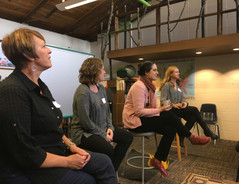Family Engagement - South Bend, IN
- Lisa

- Dec 9, 2019
- 1 min read
Keynote Speaker - Montessori Consortium of the Great Lakes Conference
October 2019
The research is clear: parent involvement in their child’s education is a key factor for student success at school. However, the Montessori pedagogy, advocating for a child’s independence and autonomy, can fly in the face of this clear success factor, leaving some parents feeling left out in the cold. In addition, many parents have chosen Montessori education without personal experience from their own schooling; this can further the gap between parent and school. For most Montessori schools, puzzling out the best balance for parent commitment, trust, and affinity, while staying true to the child’s need for self-construction and formation is a Gordian knot. On the flip-side, the challenge, when thoughtfully approached, can propel an organization to its highest purpose.
How does a school nurture and grow a mutually beneficial relationship between school, parent, and consequently the child? Look no further then our shared values within the Montessori context. Parents go through their own ‘stages of development’, have their own ‘individual learning styles’, and flourish best within a well ‘prepared environment’. There must be defined freedoms and limits, and a flattened hierarchy where reciprocal learning is promoted and valued. A culture of collaboration, harmony, and peace must not only be the center of our children’s interactions, but also the expectation among the adults. These lived practices within our schools’ mini-societies are our own work as we learn and grow alongside the children.













Comments